Filter by
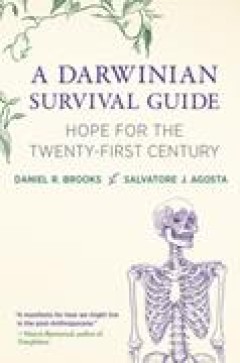
A Darwinian Survival Guide: Hope for the Twenty-First Century
How humanity brought about the climate crisis by departing from its evolutionary trajectory 15,000 years ago—and how we can use evolutionary principles to save ourselves from the worst outcomes. Despite efforts to sustain civilization, humanity faces existential threats from overpopulation, globalized trade and travel, urbanization, and global climate change. In A Darwinian Survival Guide,…
- Edition
- -
- ISBN/ISSN
- 9780262377478
- Collation
- -
- Series Title
- -
- Call Number
- 900 BRO a
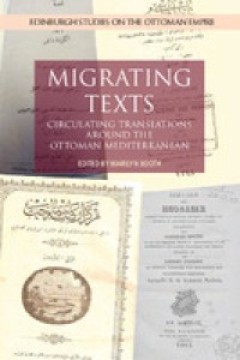
Migrating Texts : Circulating Translations around the Eastern Mediterranean
Explores translation in the context of the multi-lingual, multi-ethnic late-Ottoman Mediterranean world. Fénelon, Offenbach and the Iliad in Arabic, Robinson Crusoe in Turkish, the Bible in Greek-alphabet Turkish, excoriated French novels circulating through the Ottoman Empire in Greek, Arabic and Turkish: literary translation at the eastern end of the Mediterranean offered worldly vistas and …
- Edition
- -
- ISBN/ISSN
- 9781474438995
- Collation
- 368 halaman
- Series Title
- Edinburgh Studies on the Ottoman Empire
- Call Number
- 900 MIG
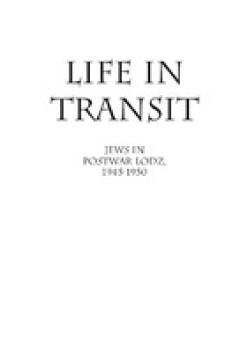
Life in Transit: Jews in Postwar Lodz, 1945-1950
"Life in Transit is the long-awaited sequel to Shimon Redlich’s widely acclaimed Together and Apart in Brzezany, in which he discussed his childhood during the War and the Holocaust. Life in Transit tells the story of his adolescence in the city of Lodz in postwar Poland. Redlich’s personal memories are placed within the wider historical context of Jewish life in Poland and in Lodz during t…
- Edition
- Ed. 1
- ISBN/ISSN
- 9781618116888;9781618119285
- Collation
- -
- Series Title
- Studies in Russian and Slavic Literatures, Cultures, and History,
- Call Number
- 927 RED l

Money and Coinage in the Middle Ages
This volume is the first in a new series entitled Reading Medieval Sources, examining different genres of sources in the Middle Ages, and this book focuses on ways of studying medieval money, and the most direct manifestation of money: coinage. It is intended to introduce readers to a range of approaches to a subject that has, traditionally, been seen as somewhat specialised domain of highly te…
- Edition
- Ed. 1
- ISBN/ISSN
- 9789004383098
- Collation
- -
- Series Title
- -
- Call Number
- 909.080

Regimes of Mobility: Borders and State Formation in the Middle East, 1918-1946
For the past two decades, insights gained from the burgeoning field of borderlands studies have enabled a new generation of scholars to challenge popular depictions of the emergence of the modern Middle East. For them, the region’s borderlands were not just mere sites of peripheral activity, but rather liminal spaces criss-crossed by global flows and circulations central to state- and nation-…
- Edition
- -
- ISBN/ISSN
- 9781474487986
- Collation
- -
- Series Title
- -
- Call Number
- -

Women, Consumption, and the Circulation of Ideas in South-Eastern Europe, 17t…
Women, fashion, consumption, luxury, and education are the main subjects of our researchers. The contributors of this volume accompanied women and objects in their travels across Modern Europe and offered thorough and diverse analyses connecting the circulation of people with the circulation of ideas. Making use of the archive materials, visual sources and museum collections, the authors pointe…
- Edition
- -
- ISBN/ISSN
- 9789004354982
- Collation
- -
- Series Title
- -
- Call Number
- -

Making Sense of World History
"Making Sense of World History is a comprehensive and accessible textbook that helps students understand the key themes of world history within a chronological framework stretching from ancient times to the present day. To lend coherence to its narrative, the book employs a set of organizing devices that connect times, places, and/or themes. This narrative is supported by: Flowcharts that show …
- Edition
- -
- ISBN/ISSN
- 9780367820886
- Collation
- -
- Series Title
- -
- Call Number
- -

Universities in Imperial Austria 1848–1918: A Social History of a Multiling…
"Combining history of science and a history of universities with the new imperial history, Universities in Imperial Austria 1848–1918: A Social History of a Multilingual Space by Jan Surman analyzes the practice of scholarly migration and its lasting influence on the intellectual output in the Austrian part of the Habsburg Empire. The Habsburg Empire and its successor states were home to deve…
- Edition
- -
- ISBN/ISSN
- -
- Collation
- -
- Series Title
- -
- Call Number
- -
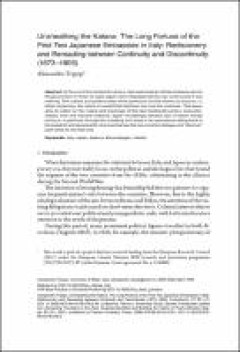
Chapter Unsheathing the Katana. The Long Fortune of the First Two Japanese Em…
At the end of the nineteenth century, Italy welcomed an official embassy sent by the government in Tokyo to make Japan more integrated into the new world scene it was entering. The cultural and political elites of the peninsula had the chance to discover, or rather rediscover, the charm of a world that had been lost over the centuries. This essay aims to reflect on the means and meanings of thi…
- Edition
- -
- ISBN/ISSN
- 9788855185790
- Collation
- Pages 19
- Series Title
- -
- Call Number
- 900 TRI c
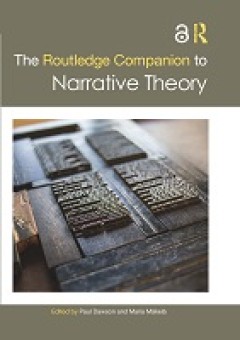
Chapter 35 Migration and Narrative Dynamics
How can narrative theory account for the changing roles of storytelling and storysharing in the public sphere? This essay proposes a new concept of narrative dynamics, one that generates well-constrained descriptions of specific elements, features, or qualities of narratives, as well as programmatic claims concerning their potential uses and effects. Narrative dynamics research is equally inter…
- Edition
- -
- ISBN/ISSN
- 9780367569730
- Collation
- Pages 15
- Series Title
- -
- Call Number
- 900 ROY c
 Computer Science, Information & General Works
Computer Science, Information & General Works  Philosophy & Psychology
Philosophy & Psychology  Religion
Religion  Social Sciences
Social Sciences  Language
Language  Pure Science
Pure Science  Applied Sciences
Applied Sciences  Art & Recreation
Art & Recreation  Literature
Literature  History & Geography
History & Geography